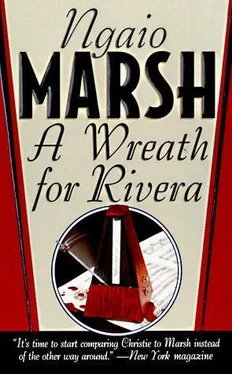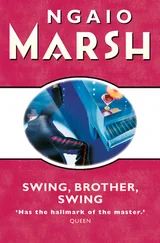“Would you say that as far as your personal observations and recollections cover them, the movements set down in the time-table are accurate?”
“Oh yes,” she said at once, “I think so. But of course they don’t go very far — my recollections. I was the last to arrive in the drawing-room, you know, before dinner and the first to leave after dinner.”
“Not quite the first, according to the time-table, surely?”
She drew her brows together as if perturbed at the suggestion of inaccuracy. “Not?” she said.
“The time-table puts Miss de Suze’s exit from the drawing-room a second or two before yours.”
“How stupid of me. Félicité did go out first but I followed almost at once. I forgot for the moment.”
“You were all agreed on this point last night when Lord Pastern compiled his time-table?”
“Yes. Perfectly.”
“Do you remember that just before this there was a great rumpus in the ballroom? It startled you and you dropped a little stiletto on the carpet. You were tidying Lady Pastern’s work-box at the time. Do you remember?”
He had thought at first that she used no more make-up than a little powder but he saw now that the faint warmth of her cheeks was artificial. The colour became isolated as the skin beneath and about it bleached. Her voice was quite even and clear.
“It was certainly rather an alarming noise,” she said.
“Do you remember, too, that Miss de Suze picked up the stiletto? I expect she meant to return it to you or to the box but she was rather put out just then. She was annoyed, wasn’t she, by the, as she considered, uncordial reception given to her fiancé?”
“He was not her fiancé. They were not engaged.”
“Not officially, I know.”
“Not officially. There was no engagement.”
“I see. In any case, do you remember that instead of replacing the stiletto, she still had it in her hand when, a moment later, she left the room?”
“I’m afraid I didn’t notice.”
“What did you do?”
“Do?”
“At that moment. You had been tidying the box. It was exquisitely neat when we found it this morning. Was it on your knees? The table was a little too far from your chair for you to have used it, I think.”
“Then,” she said, with her first hint of impatience, “the box was on my knees.”
“So that was how the miniature silver pencil you wear on a chain came to be in the box?”
Her hands went to the bosom of her suit, fingering it. “Yes. I suppose so. Yes. I didn’t realize… Was that where it was?”
“Perhaps you dropped the lid and caught the pencil, dragging it off the chain.”
“Yes,” she repeated. “Yes. I suppose so. Yes, I remember I did do that.”
“Then why did you hunt for it this morning on the landing?”
“I had forgotten about catching it in the box,” she said rapidly.
“Not,” Alleyn murmured apologetically, “a frightfully good memory.”
“These are trivial things that you ask me to remember. In this house we are none of us, at the moment, concerned with trivial things.”
“Are you not? Then, I suggest that you searched the landing, not for your trinket, which you say was a trivial thing, but for something that you knew could not be in the work-box because you had seen Miss de Suze take it out with her when she left the drawing-room in a rage. The needlework stiletto.”
“But, Inspector Alleyn, I told you I didn’t notice anything of the sort.”
“Then what were you looking for?”
“You have apparently been told. My pencil.”
“A trivial thing but your own? Here it is.”
He opened his hand, showing her the pencil. She made no movement and he dropped it in her lap. “You don’t seem to me,” he remarked casually, “to be an unobservant woman.”
“If that’s a compliment,” she said, “thank you.”
“Did you see Miss de Suze again, after she left the drawing-room with the stiletto in her hand and after she had quarrelled with Rivera when they were alone together in the study?”
“Why do you say they quarrelled?”
“I have it on pretty good authority.”
“Carlisle?” she said sharply.
“No. But if you cross-examine a policeman about this sort of job, you know, he’s not likely to be very communicative.”
“One of the servants, I suppose,” she said, dismissing it and him without emphasis. He asked her again if she had seen Félicité later that evening and after watching him for a moment she said that she had. Félicité had come to this room and had been in the happiest possible mood. “Excited?” he suggested and she replied that Félicité had been pleasurably excited. She was glad to be going out with her cousin, Edward Manx, to whom she was attached and was looking forward to the performance at the Metronome.
“After this encounter you went to Lady Pastern’s room, didn’t you? Lady Pastern’s maid was with her. She was dismissed, but not before she had heard you say that Miss de Suze was very much excited and that you wanted to have a word with her mother about this.”
“Again, the servants.”
“Anybody,” Alleyn said, “who is prepared to speak the truth. A man has been murdered.”
“I have spoken nothing but the truth.” Her lips trembled and she pressed them together.
“Good. Let’s go on with it then, shall we?”
“There’s nothing at all that I can tell you. Nothing at all.”
“But at least you can tell me about the family. You understand, don’t you, that my job, at the moment, is not so much finding the guilty person as clearing persons who may have been associated with Rivera but are innocent of his murder. That may, indeed it does, take in certain members of the household, the detailed as well as the general set-up. Now, in your position…”
“My position!” she muttered, with a sort of repressed contempt. Almost inaudibly she added: “What do you know of my position!”
Alleyn said pleasantly: “I’ve heard you’re called the Controller of the Household.” She didn’t answer and he went on: “In any case it has been a long association and I suppose, in many ways, an intimate one. With Miss de Suze, for instance. You have brought her up, really, haven’t you?”
“Why do you keep speaking about Félicité? This has nothing to do with Félicité.” She got up, and stood with her back towards him, changing the position of an ornament on the mantelpiece. He could see her carefully kept and very white hand steady itself on the edge of the shelf. “I’m afraid I’m not behaving very well, am I?” she murmured. “But I find your insistence rather trying.”
“Is that because, at the moment, it’s directed at Miss de Suze and the stiletto?”
“Naturally, I’m uneasy. It’s disturbing to feel that she will be in the smallest degree involved.” She leant her head against her hand. From where he stood, behind her, she looked like a woman who had come to rest for a moment and fallen into an idle speculation. Her voice came to him remotely from beyond her stooped shoulders as if her mouth were against her hand. “I suppose she simply left it in the study. She didn’t even realize she had it in her hand. It was not in her hand when she came upstairs. It had no importance for her at all.” She turned and faced him. “I shall tell you something,” she said. “I don’t want to. I’d made up my mind I’d have no hand in this. It’s distasteful to me. But I see now that I must tell you.”
“Right.”
“It’s this. Before dinner last night and during dinner, I had opportunity to watch those — those two men.”
“Rivera and Bellairs?”
“Yes. They were extraordinary creatures and I suppose in a sort of way I was interested.”
Читать дальше






